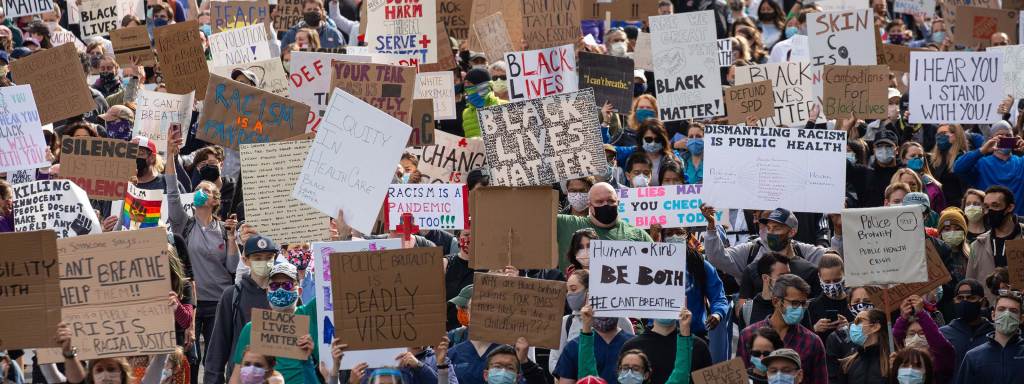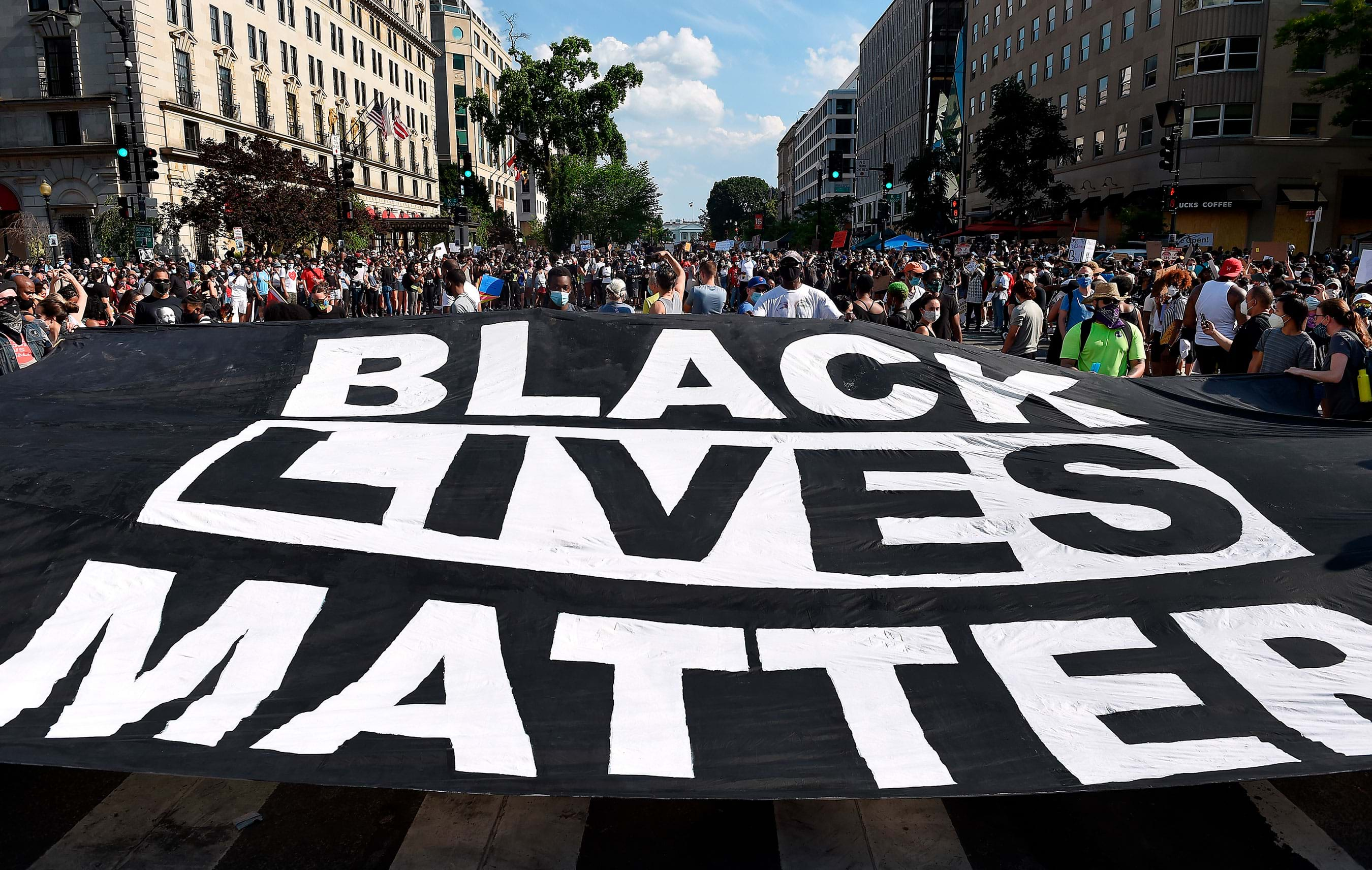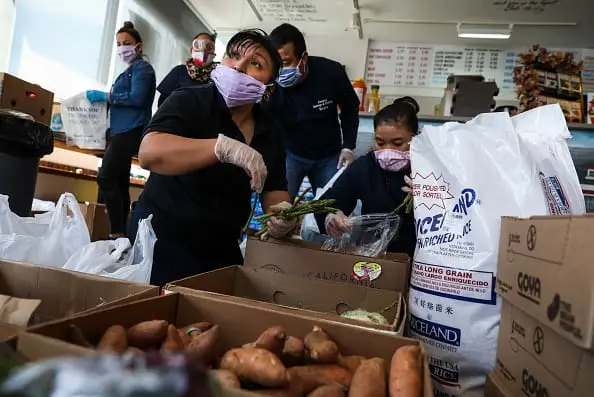
The Unprecedented and The Unchanged
We are experiencing the unprecedented. The world we knew before COVID-19 has been permanently upended. Our lives—our histories—are forever split in two: before coronavirus and after.
Beyond overflowing hospitals and understocked grocery stores, our economies have fallen off a cliff. Today, a full quarter of American workers—more than 40 million people—have filed for unemployment. Fewer than half of black adults have a job. In a mere two months, Americans have lost twice the number of jobs as in the Great Recession.

And, during these last few weeks, one pandemic has collided with another, as tens of thousands of protesters take to the streets to demand justice for George Floyd’s murder, for all the violence against black people that has gone unfilmed, and for a history of white supremacy and racial terror that remains unreconciled.
But in this moment when we, the people, are demanding more action and in need of more support, the organizations on the frontlines—championing essential workers, fighting for the rights of black and other marginalized communities, and building the systems that will be central to an equitable recovery—face their own crisis. Indeed, the economic realities brought on by COVID-19 threaten the very survival of the people, organizations, and movements behind this crucial work.
Civil Society: Needed and In Need
At another unprecedented moment, in the early days of our republic, the 19th century French historian and political scientist Alexis de Tocqueville traveled across America and was taken by its “public spirit” of cooperation. He remarked on these American “associations”: people who joined together in common cause for a common good, identifying an emerging civil society. This “autonomous area of liberty incorporating an organizational culture that builds both political and economic democracy”—America’s unique third sector—has, in the 185 years since his writing, ushered in immeasurable national and global progress.
This third sector encompasses remarkable breadth, the wide array of organizations, institutions and movements that educate, congregate, support, organize, and inspire—the organizations that stitch our nation together. Civil society is concert halls and civil rights advocacy, scholarship and prayer, food banks and fine arts programs, after-school programs and end-of-life-care, local charity and global aid. And, of course, it includes the hundreds of organizations we support—like Color of Change, the Equal Justice Initiative, Black Youth Project 100, and the National Employment Law Project—whose work remains indispensable.




These small and not-so-small “associations” have served as the beating heart of our democracy. And they are in jeopardy, as I argued in the Chronicle of Philanthropy this week.
Because of COVID-19, the nonprofit sector faces overwhelming need paired with existential threat. According to the Nonprofit Finance Fund, three out of every four nonprofits do not have six months of cash in reserve. Many have less. Already, furloughs and layoffs are hitting nonprofits—hard.
Postponed fundraisers, canceled seasons, fewer grants from foundations anticipating decreased endowments, reduced corporate sponsorships and government contracts due to internal budget cuts—all of this puts the world’s vital nonprofits at risk.
If we do nothing, the economic toll, alone, will be devastating.
According to the 2019 Nonprofit Employment Report from the Johns Hopkins Center for Civil Society Studies, nonprofits employ more than 10 percent of America’s private workforce—some 12.3 million people at last count. These nonprofits, based on research from the Urban Institute, contribute an estimated $985 billion to the economy.
Of course, losing nonprofits would hurt more than our economy. Especially at this moment when we cannot physically be with each other, civil society—the spirit and sinew of our collective civic life—is vital.
And so, we cannot simply do more of the same. Extraordinary times call for extraordinary measures. Our challenge is not to save any particular organization; it is to save the soul of our democracy itself.
A Once-in-a-century Response
During the Great Depression, President Franklin Delano Roosevelt affirmed the need for relief, recovery, and reform—in that order. Today, we must follow these same steps—beyond reform to a broader, deeper reimagination of our society.
Philanthropy has already stepped in to provide timely relief to the nonprofit sector. In New York, a consortium of foundations and funders, including the Ford Foundation, created the NYC COVID-19 Response & Impact Fund, which has raised more than $100 million to date. Hundreds of philanthropic institutions, nationally and globally, have also committed to more flexible funding to help their grantees navigate the unanticipated consequences of the pandemic.
Now, we must focus on recovery, so we can lay groundwork to reimagine what is to come.
Government ought to implement additional public policies that support civil society—including grants and loans that keep staff employed and doors open. More than 200 nonprofits joined with the National Council of Nonprofits to author a letter outlining such policies.
Businesses, too, must deploy all of the resources at their disposal, from charitable giving to consultation and technology. Companies also need to protect their workers—especially low-wage workers and workers of color—to take pressure off the nonprofit safety net.
- All videos produced by the Ford Foundation since 2020 include captions and downloadable transcripts. For videos where visuals require additional understanding, we offer audio-described versions.
- We are continuing to make videos produced prior to 2020 accessible.
- Videos from third-party sources (those not produced by the Ford Foundation) may not have captions, accessible transcripts, or audio descriptions.
- To improve accessibility beyond our site, we’ve created a free video accessibility WordPress plug-in.
And nonprofits, themselves, will need courageous, creative leaders willing to face what lies ahead and reinvent their operating models and budgets to stay viable and thrive in a post-coronavirus world.
The Ford Foundation recognizes that this once-in-a-century crisis—and the overwhelming need to emerge from it with a more just and equitable society—requires a once-in-a-century response.
As foundations, our standard practice is to spend the five percent of our endowments each year as required by law to support the financial viability of the institution into the future. We will not spend down our assets but, as I’ve written previously, we cannot limit ourselves to this five percent. We must explore and expand new ways to deploy all of our assets—including the other 95 percent—in the fight for justice.
Given these intersecting, cascading crises, Ford’s Trustees and I have concluded that we cannot and will not merely pay out what we would in a normal year. We cannot and will not allow this economic crisis to decrease our grantmaking next year or going forward. We cannot do the minimum when faced with maximum threat.
If we fail to act, civil society will suffer irreparable damage—and so will the health and vitality of our most vulnerable communities, and the future of our democracy.
And so, today we’re announcing that, for the first time in Ford’s history, the Board of Trustees has authorized up to $1 billion—financed through the sale of bonds—to help stabilize and strengthen the nonprofit sector. This is only possible because of the board’s unwavering, unstinting support, energy and commitment, which serves as a source of inspiration to all of us at Ford, that this is possible, and for that I want to express my deepest gratitude.
With this new source of funding, the foundation will make strategic investments in the individuals and organizations that are not just fighting against inequality and injustice but preparing to lead us through a post-coronavirus recovery.
A Call To Unleash Every Resource
Historically, foundations have issued debt for building acquisition and construction projects—as we recently did to renovate our New York headquarters. Never has debt been used as a tool for expanding philanthropic grantmaking.
This changes now.
A number of US foundations—including the Doris Duke Charitable Foundation, W.K. Kellogg Foundation, John D. and Catherine T. MacArthur Foundation, and Andrew W. Mellon Foundation—have joined us and, collectively, our joint commitment to additional grantmaking will add more than $1.7 billion to the nonprofit sector. I’m enormously grateful to the presidents of those foundations who have my admiration and affection: Elizabeth Alexander, Ed Henry, John Palfrey and La June Montgomery Tabron who have dedicated countless hours to our collective action. They are the very best examples of foundation leaders with bold and ambitious visions for their organizations.
If more foundations take this brave step, our sector could generate untold billions of dollars to rescue nonprofits. We could ensure that civil society emerges from this pandemic and economic collapse more resilient and effective than ever.
Philanthropy has a special responsibility. Given our resources, we can support programs and initiatives that others might consider a financial burden. We can, will, and must invest in organizations that attack the roots of systemic inequality this virus has laid bare. And as we fund these vital recovery efforts, we must reimagine our systems—reimagine our democracy, our economy, our culture for the better.
In another tumultuous and violent year, 1968, Dr. Martin Luther King Jr., shared his concern with friend Harry Belafonte that, despite the progress they had seen, America and its systems were still “a burning house.”
When asked what to do about it, Dr. King said, “I guess we’re just going to have to become firemen.”
I return to this exchange often. It clarifies that, despite the scale and complexity of the problems we face, we still share a universal imperative—to become firefighters for justice. To do, whatever it is we do, for justice.
At this moment, it is not enough to douse the “burning house” in front of us. It is not sufficient to lend a hose and then move on. We must, further, think, and act, like firefighters. We must make it our mission to save lives—to rush in where others turn away, take brave and extraordinary action, and attend to the emergency at hand.
We must stop the forces of destruction at their source with every tool and resource we have at our disposal. We must assess the damage caused by these inequalities and set the conditions in which we can build something new.
The lifting will be heavy. It will require humility and selflessness, listening and elevating the lived experience over ego and abstract expertise, and the moral courage to stand up for the rights and dignity of every human life. It will demand that the privileged among us not only give something back, but also give something up.
We live in a culture that makes these things hard—but what makes doing them worthwhile and meaningful is the hope that doing them now will create a better tomorrow. And that hope is the oxygen that allows our movements and institutions and democracy to breathe free.
Ultimately, we need hope—a hope born not from idealism or naivete, but from a stubborn, determined recognition of what we owe each other, and the actions we take today and every day, will bring us closer to the future we seek. We need hope that united—on the other side—we will realize justice for all.
